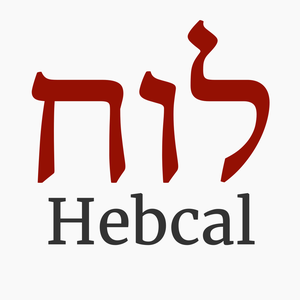Your comments
Thanks for using Hebcal.
We regret that we currently don't have the expertise to research this. Do you have a good reference you can point to that lists all of the Chabad holidays that are separate from the standard Jewish holidays?
Thank you for using Hebcal. We are sorry to hear you are having difficulty seeing fast days in your Outlook calendar.
Which fast day is missing? We see Tzom Gedaliah on October 6, Asara BTevet on January 10, etc.
Thank you for the suggestion! We will consider this for a future version of the Hebcal website.
Shana Tova! We wish you a good inscription in the Book of Life.
Thanks for the feedback. We see how this was confusing.
The page was giving the date and linking to the Vayakhel (single parsha) for 2025. We have corrected it so it now more clearly displays the following:
Parashat Vayakhel-Pekudei is the 22nd and 23rd weekly Torah portion in the annual Jewish cycle of Torah reading. Next read on14 Mar 2026 / 25 Adar 5786.
Thanks for using Hebcal. Hebrew year 5785 is not a leap year.
Vayakhel and Pekudei are read separately in 5785
- Vayakhel 5785 (22 Mar 2025)
- Pekudei 5785 (29 Mar 2025)
To see when the parshiyot are read separately or together in the Diaspora, consult the List of Dates section of
Thank you for using Hebcal and thanks for contacting us about this error in the weekday leyning spreadsheets.
Another user reported this error and we fixed the spreadsheets on Friday right before Shabbat. If you check again, you will see the following corrected readings, which concur with the conservative Luach Hashana 5785 published by Rabbi Miles Cohen
| Date | Parashah | Weekday Aliyah | Reading |
| 7-Oct-24 | Vezot Haberakhah | 1 | Deuteronomy 33:1-33:7 |
| 7-Oct-24 | Vezot Haberakhah | 2 | Deuteronomy 33:8-33:12 |
| 7-Oct-24 | Vezot Haberakhah | 3 | Deuteronomy 33:13-33:17 |
| 10-Oct-24 | Vezot Haberakhah | 1 | Deuteronomy 33:1-33:7 |
| 10-Oct-24 | Vezot Haberakhah | 2 | Deuteronomy 33:8-33:12 |
| 10-Oct-24 | Vezot Haberakhah | 3 | Deuteronomy 33:13-33:17 |
| 14-Oct-24 | Vezot Haberakhah | 1 | Deuteronomy 33:1-33:7 |
| 14-Oct-24 | Vezot Haberakhah | 2 | Deuteronomy 33:8-33:12 |
| 14-Oct-24 | Vezot Haberakhah | 3 | Deuteronomy 33:13-33:17 |



That's great! Thank you for sharing!
Thanks again. We have corrected the verses on Hebcal.com so they now align with Sefaria.org.
Hi, thanks for using the Hebcal APIs!
The date range in the example you posted is from 2025-01-24 to 2025-01-25. Rosh Chodesh Sh’vat occurs on Thursday, 30 January 2025.
The Shabbat times REST API a similar URL and response format as our full Jewish calendar REST API, but offers less control over the dates and times. If you find you want more fine-grained control over the date ranges, or what kinds of events are included and which are excluded, we recommend using the full Jewish calendar REST API instead.
Customer support service by UserEcho


Hi, thanks for using Hebcal.
You are welcome to use the free Yahrzeit + Anniversary calendar located at https://www.hebcal.com/yahrzeit
This webiste was designed for individuals, not minyanim, so it's quite limited in its features and offers only a few options for customization. We definitely don't have all of the the features you described. For example, there is no login protection - only an "unlisted link" mechanism that permits anyone who has the link to edit the page. At this time, we don't have plans to add additional features like logins, nor do we have any capability to offer any further customization of the current product.
Feel free to use our existing tool as it is, or consider a commercial solution like ShulCloud for your minyan.
Shana Tova and G'mar Chatima Tova!